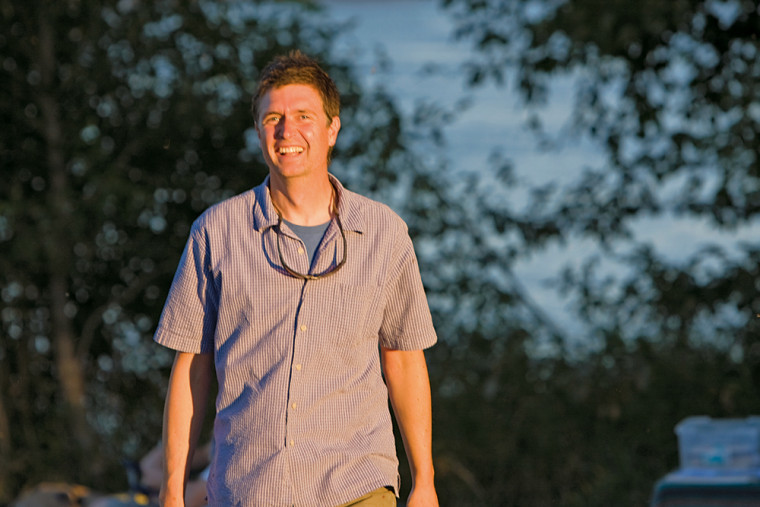River Warrior for the Columbia Watershed
Open gallery

Exploring forests, romping in creeks, and swimming in lakes and rivers near the eastern shores of Lake Michigan, Brett VandenHeuvel JD ’05 fell in love with the great outdoors. He grew up near Muskegon, where the industrial south transitions into the rural north.
“My mom taught me a lot about wildflowers and birds,” he says. “We spent a ton of time outside.”
Today, VandenHeuvel (pronounced Vanden-HOOvel) lives and works in the Columbia River Gorge, where he continues to nurture his affinity for nature.
“I’m working toward the return of abundant salmon runs in the Columbia,” says VandenHeuvel, executive director of Columbia Riverkeeper. “People should be able to catch and eat fish without fear of toxic exposure. They should be able to swim on hot summer days in clean water.”
His path to river advocate began as a student studying geology at Michigan’s Hope College. He earned his bachelor’s degree and went to work for the Oregon Museum of Science and Industry as a naturalist and educator. He designed and taught community education classes about high desert ecology, Cascade volcanoes, snow studies, and animal tracking.
While obtaining a master’s degree from the University of Maine, VandenHeuvel conducted climate change research in Antarctica, New Zealand, and Alaska. Eventually, he became frustrated with the lack of meaningful communication between scientists and policy makers.
“I realized that I’m not good at being a neutral observer,” he says. “I told my wife that I just wanted to pick the right side of an issue and argue for it. She said, ‘That sounds like what a lawyer does.’”
What I like most about Columbia Riverkeeper is that, unlike big national organizations in Washington, D.C., we work locally within our watershed, getting to know it intimately. I need that direct connection with the area I’m protecting and restoring.Brett VandenHeuvel JD ’05
So VandenHeuvel received his JD from Lewis & Clark Law School and started his own practice.
“As a new attorney, I found an incredible support system within Portland’s environmental and public interest law community,” he says. Columbia Riverkeeper was one of his clients, and he soon joined the organization as a staff attorney. He took the helm as executive director in 2009.
“What I like most about Columbia Riverkeeper is that, unlike big national organizations in Washington, D.C., we work locally within our watershed, getting to know it intimately,” he says. “I need that direct connection with the area I’m protecting and restoring.”
In recent years, VandenHeuvel says one of the biggest threats to the Columbia has been “dirty industrial energy projects that threaten to destroy valuable habitat.” Columbia Riverkeeper has successfully thwarted plans by energy speculators from New York and Texas for two liquefied natural gas ports and storage terminals in the lower river. The organization has also caused a major coal export company to pull its initial application for a facility in Longview, Washington.
“A big part of our success is understanding what we’re good at and where we can make a difference,” says VandenHeuvel. “We engage in long-term strategic decisions, building relationships with federal agencies and fighting for incremental change in improving water quality over time.”
Riverkeeper has a six-person staff. In 2008, Lauren Goldberg JD ’08 joined the organization as a staff attorney, focusing on environmental justice and holding polluters accountable for violating the federal Clean Water Act. Numerous other students and alumni from Lewis & Clark Law School have contributed their expertise since the organization was established in 1989.
Columbia Riverkeeper also relies heavily on an army of organized volunteers to monitor water quality and to help cleanup the river and its tributaries through the Adopt-a-River program.
“A lot of environmental decisions begin at the local level,” he says. “We have a great grassroots network of citizens who notify us of problems, testify at hearings, monitor pollution, and recruit other volunteers. The Columbia belongs to all of us. It’s essential we share responsibility for its health—before it’s too late.”
—by Pattie Pace
More L&C Magazine Stories
Lewis & Clark Magazine is located in McAfee on the Undergraduate Campus.
MSC: 19
email magazine@lclark.edu
voice 503-768-7970
fax 503-768-7969
The L&C Magazine staff welcomes letters and emails from readers about topics covered in the magazine. Correspondence must include your name and location and may be edited.
Lewis & Clark Magazine
Lewis & Clark
615 S. Palatine Hill Road MSC 19
Portland OR 97219

